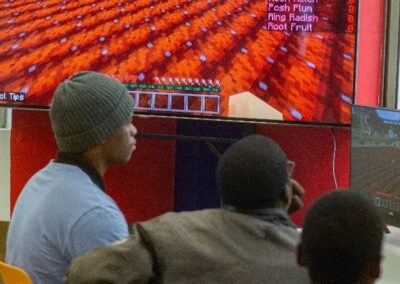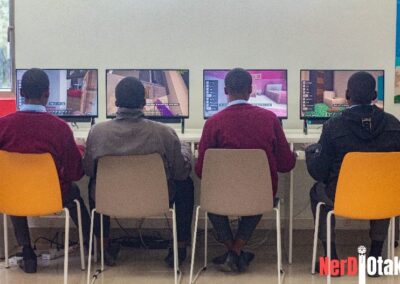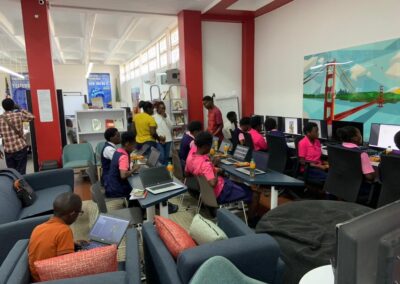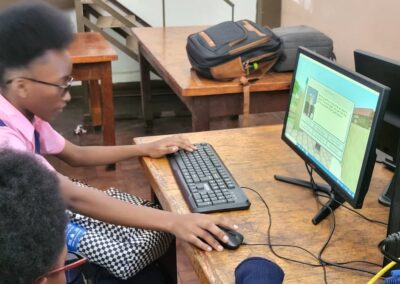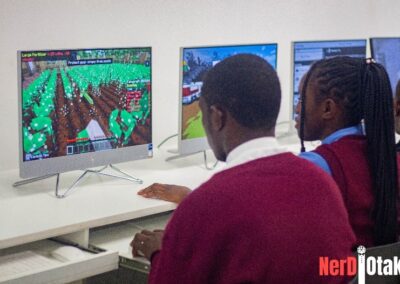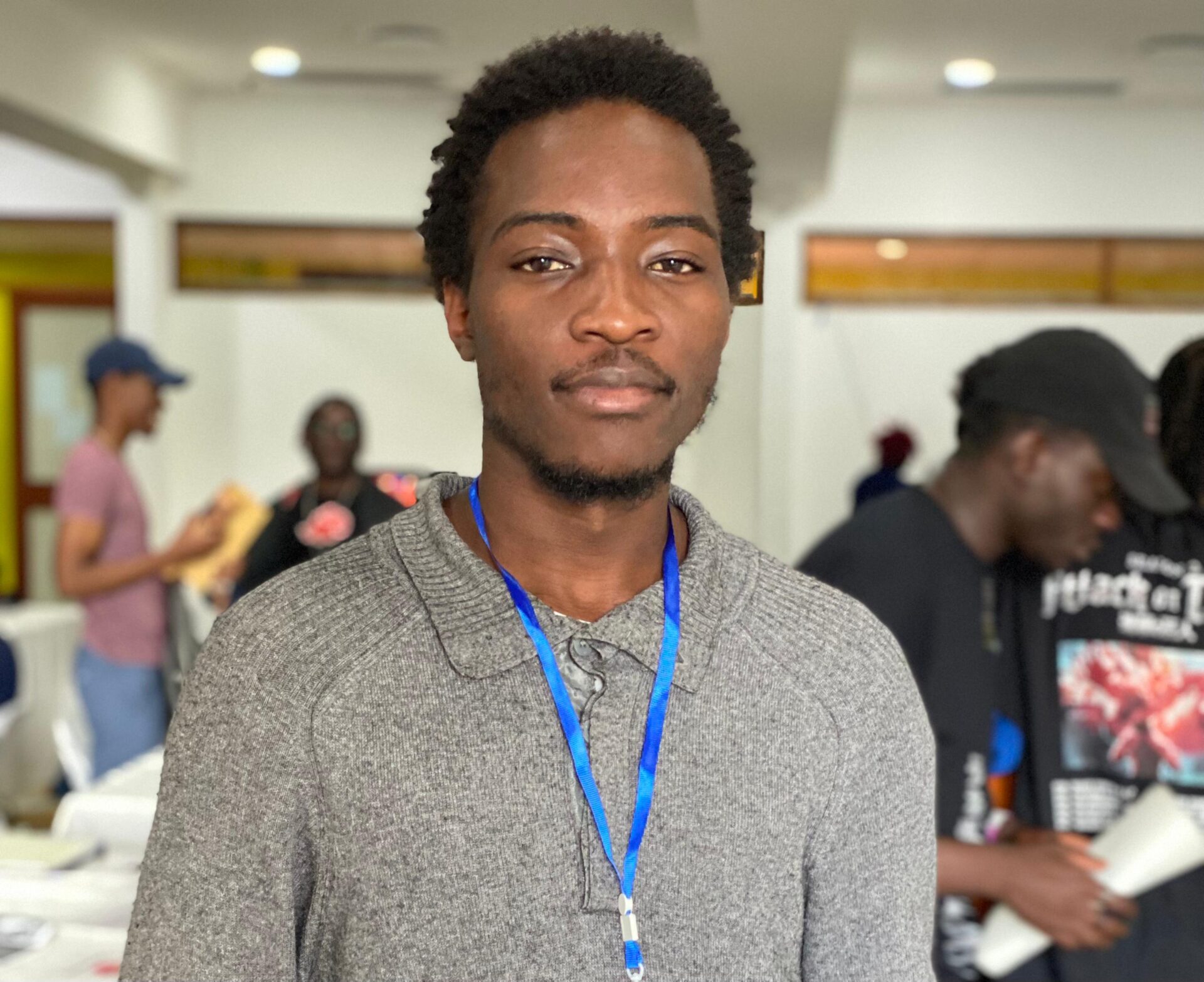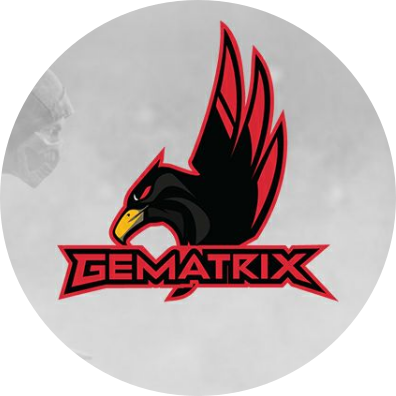ESPORTS IN EDUCATION: FARMCRAFT 2024 ZAMBIA
The initial thought an individual would have when the word ‘sport’ is uttered is, kicking footballs or running fast to build an athletic physical body for endurance and play performance. Recently, but not quite, Zambia was introduced to a different sport; electronic sports. This form of competition uses video games as a platform to compete, and showcase certain acquired skills, primarily cognitive skills. It is often organized in a multiplayer setup, played as a team or an individual at a local, national, or intercontinental scale. Recognizing esports as a competitive sport has brought in many investments in different sectors. Rarely, though, does esports get mentioned in the same breath as education.
“ ‘What are you learning from these things?’ ‘Do these games even benefit you?’ “
Growing up in a Zambian household, whenever I would spend a substantial amount of time playing video games, my parents would loudly ask me, “What are you learning from these things?” “Do these games even benefit you?”. They would say this while pointing at my console. Stubborn as ever, I am here to answer some of those questions and explain how esports can be used as an educational tool.
The variety of ways in which esports can be utilized is limitless. Students can be transported from their school desks to an underground mine using technological advancements such as virtual reality. This provides a space and environment for real-life simulations of a particular place. This makes it very safe to experience and learn dangerous experiments; all this can be taught in a classroom.

Besides complex, high-tech equipment and machines that are usually too exposed to acquire, video games can be played even on personal computers, tablets, and mobile phones. This makes them highly accessible and attainable, even to students. With the simple use of a keyboard and mouse, learning can be as easy as clicking.

There are numerous benefits that schools provide. Amongst them are, discipline, analytical skills, career preparation, cognitive and communication skills, and the overall, development of children in early childhood. This educational structure and environment help develop their skills, and mindset that would later mature as healthy habits and productive opinions. Esports improves the ability to simultaneously use both eyes and hands, commonly known as hand-to-eye coordination. It helps students to carry out experiments and all sorts of writing more efficiently and effectively.
It is common practice and considered good etiquette to send a “gg” message which means ‘good game’ to opponents, showing respect to other players. Healthy competition is encouraged at any Esport event. By making friends in the gaming community, mental well-being can drastically improve among students. This provides a space where they can share ideas and socialize with one another. Gaming can also be a way to relax and relieve stress.
The overall key for schools to benefit from esports is to offer activities that appeal to as many students as possible. Schools can work with organizations to establish an esports club or team and help bring communities together. On the 29th of June, Nerd|Otaku hosted an esports event called The Meet. One of the objectives of The Meet was to embrace video games for sports and leisure. Activations, which are pre-event campaigns, were hosted targeting young students to educate and spark interest in esports, and also search for small communities within the schools.
One of the schools visited was Kabulonga Girls’ Secondary School. With permission from The District Education Board Secretary and the school, esports stations were placed at the gym without disrupting ongoing lessons. Students went by the stations to learn the important aspects and benefits esports comes with. Such little collaborations can go a long way in terms of creating safe spaces, clubs, and communities in Zambian schools.

Esports in Zambia is a steadily growing industry, although most times it might feel stagnant. But with in-depth research and minor history, you’ll see teams like Team Gematrix compete at a continental esports tournament. The increasing number of local esports tournaments hosted in the country helps put esports on the radar of big corporations, organizations, and companies who are slowly recognizing it as a sport.
Esports is inclusive to anyone regardless of gender, age, and physical strength.

Farmcraft
What is Farmcraft?
“Farmcraft 2024 by the Network of Academic and Scholastic Esports Federation, the US Department of State, and American Spaces is an educational program that uses Minecraft to enhance the understanding of the challenges faced by agricultural producers and distributors around the world. The program was open to all ages but designed to supplement the learning of students ranging from 8-18 years of age.
Farmcraft focused on food trade, food security, and alternative methods of agriculture such as vertical or hydroponic farming, plus incorporating digital technology into food systems. Participants also determined who they would sell it to and how they could get their crops to market. The agenda was to enhance the understanding of challenges faced by agricultural producers and distributors on a global scale. To educate young children and build interest in agriculture through gaming.”
To provide a safe space to assist students to learn, grow, and thrive. American Spaces in conjunction with Bongohive, Nerd|Otaku, and Junior Agripreneurship Hub, provided a physical session where students tested, accompanied, competed, worked, and played together. 4 physical sessions were held; 1 in Lusaka at NIPA American Corner, and 3 on Copperbelt at CBU American Corner.
Farmcraft is the perfect game to use as a medium to educate; many would say and I would agree. Not only does it imitate real-life scenarios such as bad weather, but also it can help students develop good habits and require skills to sustain their objectives in the game. These skills are; resource management, planning and patience, and collaboration and teamwork
Resource management: At the start of the game, players are given limited resources like water, soil(land), seeds, and equipment. Natural disasters such as rainfall may occur, which can affect the crops. With each successful harvest, you’re rewarded with cash by selling your produce at the market. This money can be used to build a greenhouse, buy more machinery and equipment, buy more land to expand your farming, or save it for a rainy day. This can teach students how to budget properly, be problem solvers, and build consistency to sustain a great harvest every season.
Planning and patience: To build on consistency, students were required to plan, “What crops are good for the season?” “What machinery will help increase my yield?” “Do I invest in more land, now or later?” All these questions manifested as a monologue in their minds, as they tried to complete their objectives and determine what decisions they could make. This can sharpen their foresight, cultivating patience, decision-making, and adequate planning.
Collaboration and teamwork: During registration, it was required and also encouraged that the students register as a team. They used names that they associated with what they all loved and I assume some picked what sounded ‘cool’. One of my favorite names was “Totally Skies” because I recognized the reference used. Farmcraft provided a lobby where teams would log in and play together; including a tab where they could see the current objectives the team needed to do. This played out well in terms of communication and teamwork. They built their communities where they discussed innovative maneuvers to weed out problems together and see how best to go about strategies and planning, giving them a positive social experience.
Farmcraft also had fun elements that provided the students with customizable skins the game character would wear. They picked outfits suitable for their characters, such as boots and protective gear.

All this showed how they developed and learned about sustainable farming practices like crop rotation, environment-friendly methods of farming that reduce pollution and increase soil fertility, and energy conservation, through eco-friendly habits. There were so many more farming practices that they learned, that I can mention just through the video game.
One of the most annoying things, I experienced whilst playing the game was when pests and butterflies would show up. You had to eradicate them by spending money you had made from your previous harvest to buy pesticides, and yes, there’s a limit to how much pesticide you can put that wouldn’t damage your crops.

The main aim of the physical session was to establish how well esports can fare to school-going pupils and whether or not it would work as a learning curve. This observation taught me more than I could imagine. Finding a way to co-relate the aspect of young students learning while they play video games will change the dynamic of Zambia’s school curriculum. Also, putting into play how technology is advancing, the use of digital farming will allow significant advancements in farming practices driven by the integration and adaptation of digital innovations and technology and make any sort of reach towards students easier.
From simple observation, you would witness how students approached, enjoyed, and learned, during the physical sessions. It boosted morale in situations where teamwork was encouraged with each progress in visual reach of the other. They tried to learn how to increase their yield on the spot. As an observer and coach, I witnessed that in real time.
NASEF presented virtual challenges which participants joined to learn about what choices farmers make even before they plant their crops. 44 teams and 113 players represented Zambia in the global competition which had over 8500 participants. There was representation from Lusaka, Copperbelt, Central, and Southern provinces! The following were some of the results:

Placed 22nd in the All-Ages Division

Placed 60th in the Senior Division

Placed 66th in the Senior Division
Raffle Draw Winners from Zambia were Team CBU and Totally Skies.

Sepo Konayuma, a participant and facilitator at the Copperbelt University in Kitwe, Zambia, had this to say about Farmcraft. “I had the privilege of being part of the NASEF Farmcraft® Competition organized by American Spaces.
Collaborating with teams from The Copperbelt University, I witnessed the enthusiasm and dedication of participants throughout the competition. Despite scheduling conflicts and technical issues like server connectivity problems, the teams displayed remarkable resilience and determination. Through effective teamwork, we overcame obstacles and made significant progress
Participating in Farmcraft was a valuable learning experience for both students and facilitators. We gained insights into the innovative applications of technology in agriculture and realized the importance of collaboration in overcoming challenges. Notably, the use of hydroponic towers was particularly impressive, showcasing the potential of technology to revolutionize traditional farming practices and address global food security concerns.
To enhance the organization of eSports events like Farmcraft in Zambia, it’s crucial to increase awareness and accessibility. Educating students and institutions about the benefits of participation can boost interest and engagement. Additionally, providing support and resources to navigate technical challenges would improve the overall experience for participants
I extend special commendation to the organizers, NASEF and American Spaces, for their dedication and vision in orchestrating the Farmcraft competition. Their commitment to promoting innovation and education in agriculture through eSports events like Farmcraft is commendable and has provided valuable opportunities for students and institutions alike.”
In conclusion, the NASEF Farmcraft® Competition catalyzes innovation and collaboration in the agricultural sector. Despite challenges, the competition sparked creativity and provided invaluable learning experiences. Moving forward, efforts to enhance the organization of similar esports events in Zambia will further foster a culture of innovation and excellence in agriculture.
Read More Of Our Stuff
The Rise and Fall of Gameloft
The story of Gameloft, once a titan in the mobile gaming industry, is a fascinating reflection of the broader rise and fall—and subsequent resurgence—of mobile gaming as a whole.
2025, The Year The Average Gamer Upgrades
With Nvidia entering their 4th generation of ray tracing cards, and gamedev companies shoving excessively demanding requirements down our throats, is it time to finally get with the program and conform?
Ten Years of The Video Game Awards
The medium of film or motion pictures has existed for just over 100 years now. 50 years in, they had already established a canon, and a set of values or expectations that creators and the audience had become accustomed to. A substantial contributing factor to the established canon of film was the implementation of the Academy of Motion Picture Arts and Sciences Awards, also known as the Oscars.

